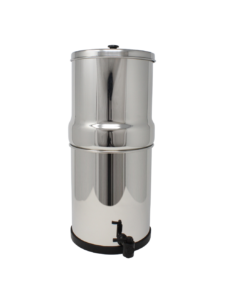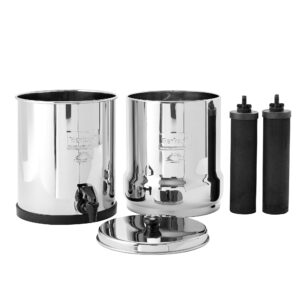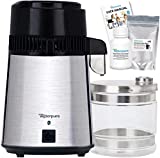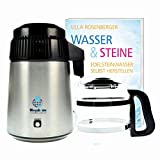
Wholefoods
Dried pulses and beans: red lentils are the quickest to cook. Keep a stock of dried red lentils for soups, dhals and adding to stews. Dried beans, chickpeas and other lentils are useful, but take a long time to cook unless you have a pressure cooker. To save your home energy, best to keep tins of these in store as well. Also worth storing: rice, millet (very nutritious, and much quicker to cook than rice; around ten minutes), green lentils, bulgur wheat, cous cous, noodles, pasta, split green peas, roasted buckwheat, wheat/spelt grains (for grinding/sprouting), sunflower seeds, sesame seeds, pumpkin seeds, various nuts, dried fruit, dried milk, muesli/breakfast cereal, porridge oats, flour, baking powder, dried yeast, honey, peanut butter, black peppercorns, turmeric and any herbs and spices you use regularly. And don't forget any pets: keep supplies of non-perishable food for them too.
Fruit and Vegetables
Potatoes should be kept in a hessian sack or thick brown paper sack/bag in a cool, dark place. Check regularly and remove any which are rotting. Sprouts can be rubbed off: the spuds will still be edible.
Onions and garlic store well at room temperature. Too cool, and they sprout. The green sprouts can be eaten.
'Winter' squashes store well in a cool place, usually till late January.
Some apple varieties will keep till Christmas in a cool, darkish place. Check regularly.
Carrots, beetroot and parsnips are best kept in the ground where they are growing, or in a cool, dark place.
Dried fruit is best for storing. Peeled, cored and thinly sliced pieces of apple can be dried on a horizontal cane or string in front of/above a wood burning stove or Raeburn.
Tins and miscellaneous
Depends on what you like to eat. Basic recommendations: tomatoes, baked beans, beans and pulses as above, sardines, tuna, anchovies (for flavour), soups, apricots, peaches, pineapple in juice.
Also tomato puree, bouillon/stock powder, Vecon, Natex (both from wholefood stores) or marmite/Bovril, vegetable oil, cider vinegar, spices and dried herbs. Chocolate, and anything else you like is useful too, and sugar for preserving. Alcohol isn't great in times of stress, when you want to stay as fit and healthy as possible, especially as it makes you less vigilant.
Water
Store some 5 litre plastic containers of water (Sainsbury's are the sturdiest), and/or 1 litre glass bottles of water (Waitrose has these at £1.00 a throw, but you can reuse the glass bottles safely, unlike plastic ones). It may be worth keeping empty screw top glass bottles and jars to use for water storing in an emergency, and a couple of large camping water containers too. Water containers can be safely cleaned with Steradent tablets or pop into Roys for the wine bottle cleaning solution in their brewing section.
In an emergency, you can use water from a toilet cistern (not the pan!) for washing, etc. If you know there's going to be a water supply cut-off, fill a bath to store fresh water (make sure the plug fits well), and use buckets, bowls and any spare containers. Rainwater from a water butt may be full of toxins from chemtrails, etc. (isn't everything?), but can be used for washing or put through a filter for boiling and drinking/cooking.
With regards to filtering you can either filter or distil the water. Filtering is as good as the filter and the various products out there do similar but slightly different jobs in getting rid of large particles, some chemicals and nasties whilst a distiller removes pretty much everything.
British Berkefeld made by Doulton do a good freestanding stainless steel filter, which comes with a pair of 'Super Sterasyl' filter 'candles'. These might need replacing every year for around £40 a pair. See Doulton.com
Fluoride filter candles are also available, at c £70.00. Both the Super Sterasyl and fluroide candles are attached in the top section into which you pour the water that then filters down into the lower chamber to be tapped off.
The other big, newer name on the block, is Berkey water filters. They look surprisingly like the Berkfeld but have separate fluoride filters attached to the carbon filters. So the carbon filters sit in the top chamber and the fluoride filters, if you choose to use them, screw onto the carbon filters giving a second filtration stage. However the fluoride filters are made with aluminium and do sit in the bottom chamber in the filtered water so not ideal.
You can also buy more expensive whole house filters and small inexpensive jug filters from healthy-house.co.uk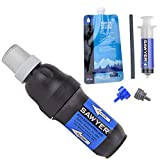
It may also be worth getting a portable camper/walker's backpack water filter for real emergencies. A well known amongst hikers product is the Sawyer Squeeze. You fill the bag with whatever water you can get and then let it filter through the bottle. These do fit quite well in old plastic drink bottles for collecting the filtered water.
Distillation would be the other choice if electricity is still running. It pretty much removes everything from the water which some argue includes good salts and minerals but this only amounts to less than 10 or so good minerals whilst a pinch of Himalayan salt adds back 92. Nutritionists would also argue that we should be getting our minerals from more bio-available food sources as absorbtion from water is not ideal.
The two big names are Make Water Pure and MegaHome. Both as you can see below look similar and do work the same but at slightly differing price points.
Other Items
Toothpaste, spare toothbrushes, soap, soap powder/liquid, any medicines you use, bleach, over the counter pain killers, first aid kit, matches, candles/nightlights, batteries, loo rolls.
In an emergency, think how you will keep warm. Make sure you have plenty of warm clothing, heating fuels, blankets and hot water bottles. A general rule of thumb in prepper planning is to try and source all your household inputs from as many different sources as possible, so if one or two go down, you've still got something left i.e. fire/wood stove, gas, electrics, solar for heating; calor/bottled gas for cooking
Useful prepper items
Small, portable calor or propane gas stove: be aware that for these you'll also need a supply of non-renewable canisters, and once these have gone, they'll be gone, as everyone else will be after them too. Larger, two ring camping gas stoves are better, as you can (hopefully) buy larger, refillable gas canisters for these. Kelly kettles are great if you can operate them safely outdoors, using a handful of dry sticks and pinecones. Best for boiling water, though you can get a small 'cooking' adaptor for them. Small stainless steel pans for use with all emergency cooking appliances are good too. And in a real emergency, you can cook over an outdoor fire.
Torches, batteries, bicycle (and spares/repair kit), good walking boots and outdoor/waterproof clothing, wind up or battery operated radio (emergency use only, to get information if you can see through the propaganda!), non- mains powered phone, mobile phone and charger/solar charger.
